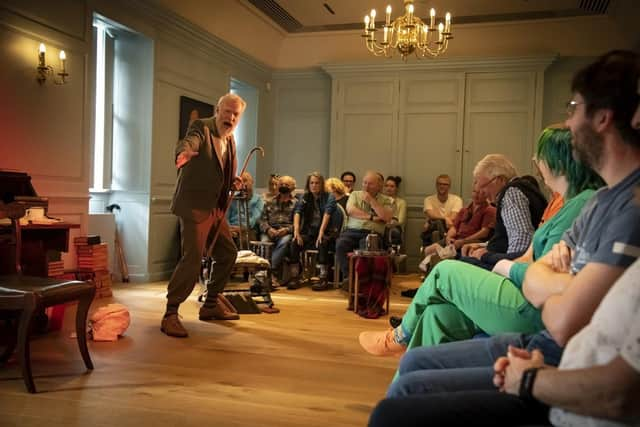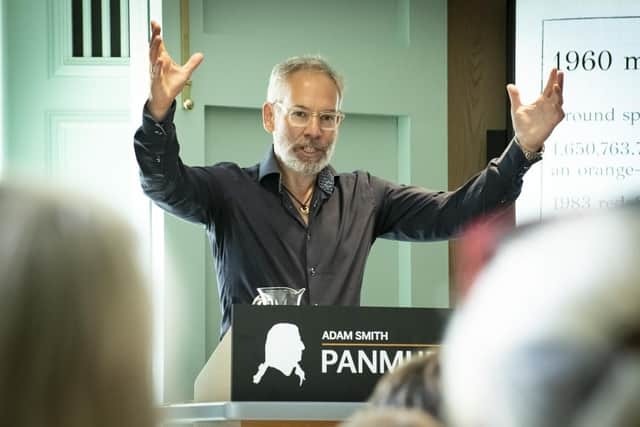The remarkable ‘love story’ between great thinkers Adam Smith and David Hume is told in a new play
The play, exploring their deep relationship, is performed at Panmure House in Edinburgh, where Smith lived for the last 12 years of his life, and where he died in 1790.
Writer Duane Kelly discusses the relationship and his play, Enquiry Concerning Hereafter, in the podcast, Adam Smith and David Hume: An 18th Century Bromance.
He says: “What I saw was a love story as the essence of Smith and Hume’s relationship. Intellectual sharing was a huge part, but more profound and deeper was their friendship. This relationship with each other was the most important in their lives.”


Andy Corelli, the play’s director, says: "I suppose the modern terminology is bromance. Reading some of the letters they wrote, it's clear there is deep friendship, trust and respect for each other, but also joviality and sarcasm."
The play is in two acts - one focusing on the death of Hume, the other on the death of Smith. They both meet Charon, the boatman who ferries dead souls across the River Styx.
Kelly never imagined his play would be performed in the place where Adam Smith died, and revised his masterworks, The Wealth of Nations and The Theory of Moral Sentiments.
"It's remarkable," he says. "I feel very blessed. There's also an eerie element with an actor reading words I wrote and 'dying' in a bed in the house where Smith actually died.”


As well as their personal relationship, Smith and Hume’s intellectual interplay is vital to the production. Although Hume was the older 'brother' by 12 years, Kelly believes they were "intellectual equals" who drove each other on.
He says: “They welcomed their ideas being challenged by each other, and recognised they both derived great benefit from that. Built into their relationship was challenging, arguing, questioning. This made them both better thinkers and writers."
One powerful scene features a furious exchange between the friends after Hume, near death, asks Smith to publish his book, Dialogues Concerning Natural Religion.
Smith, who is uncertain, says: “No questions are more fundamental to the human condition than the ones in here - but society is unready”, later adding: “Many will see this as blasphemy.”


The discussion over the existence of God - and what that meant for life, and after-life (the 'hereafter') - is a key theme. The fusing of the intellectual and personal is crucial to what Duane Kelly tried to achieve, Andy Corelli believes.
"He wants to give a higher profile to both characters, the importance of their thoughts and philosophies and how that applies to the modern world. But he also wants to take them down off a pedestal, so people can relate to them, as real and interesting characters who have shaped modern day thought."
The play is part of a series of Fringe events at Panmure House, which was renovated from near dereliction to harness the spirit of respectful Enlightenment debate to address 21st century challenges.
The Fringe programme also opens up Smith to new audiences and includes a children's show featuring Smithy, a bewigged, costumed character with an oversized head made by the company which creates heads for TV’s The Masked Singer. And the Adam Smith Tercentenary Celebration Lecture series will run on selected days from the 15 to 24 August.
Laura Smith-Gulliver, Programme Executive at Panmure House, says: “Smithy opens conversations with different people. They might come over and see him, have a chat and find out more. It’s an interesting dynamic talking to people about Smith in the street.”
Blair Barrows, also Programme Executive at Panmure House, adds: “We’re not open to the general public throughout the year, but we are during the Fringe. It’s an opportunity for the local community and visitors to see really good shows, and feel that connection to Adam Smith.”
Panmure House re-opened in 2018 after a 10-year refurbishment overseen by Edinburgh Business School, part of Heriot-Watt University. Its main rooms have been recreated to reflect the time Smith lived there.
After its physical restoration, Panmure House’s intellectual rebirth is underway. Professor Adam Dixon was named the first Adam Smith Chair in Sustainable Capitalism and further appointments will follow to create a 21st century academic research powerhouse.
Laura Smith-Gulliver explains: “We run a lot of different programmes, all focused on bringing nuanced debate back to the home of Smith as it would have been in his day.”
Enquiry Concerning Hereafter will be performed from 5-27 August at Panmure House (no shows on Mondays). Full details: www.panmurehouse.org/programmes or https://tickets.edfringe.com/whats-on/enquiry-concerning-hereafter - and listen to a podcast on the history and rebirth of Panmure House here